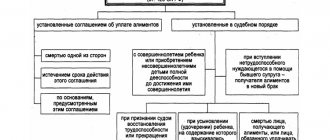Home » Alimony » How to reduce alimony debt
2
Child support must be paid for many years until the child reaches adulthood, and in some cases even after that. During all this time, many things can happen, including things that can lead to a decrease in income. This automatically leads to a decrease in the amount of alimony payments, and this is where a vicious circle begins: the debt accumulates, a penalty is charged on it, and the amount of the debt increases more and more. And this despite the fact that the payer cannot even pay the amount that was originally due. In such a situation, you can try to reduce the alimony debt (and if you’re lucky, write it off altogether), but this can only be done if problems with income arose for very good reasons.
Reasons for accumulating debt
Various situations may occur in life that lead the payer to accumulate alimony debts. This is important when considering the issue in court and making a decision to reduce the amount of payments.
The reasons for the formation of debt include:
- Intentional deviation from fulfilling obligations. In such cases, the court rarely accommodates the debtor.
- The accounting employee made a mistake when calculating deductions. It is recommended to resolve the issue before going to court.
- There is no financial ability to pay debts, for example, due to losing a job or becoming disabled. These are the most common reasons for filing a claim. We will dwell on them in more detail below.
- The recipient of the money did not inform the payer about the details for transferring funds and hid his position. In such circumstances, the debt arises through no fault of the debtor party.
The likelihood of success in court depends on the reason for accumulating debt. This point must be taken into account before filing a claim.
Reasons for refusal to consider an application
In some cases, the court may refuse the debtor's request. Cases in which a plaintiff may be refused are regulated by 134 and
135 articles of the Civil Procedure Code. Such situations include:
- filing a petition by an outsider who does not have the appropriate authority;
- a court decision has previously been made in the case;
- the application was submitted to an authority that does not deal with such matters;
- the plaintiff is incompetent;
- the applicant refuses to initiate the process.
Why is it recommended to reduce child support debt?
Lawyers recommend not delaying debt repayment and fulfilling the obligation within a short time frame. This is due to the fact that the legislation strictly monitors the observance of children's rights and punishes debtors who refuse to pay. The appearance of debt is fraught with the following consequences:
- Cancellation of a driver's license if a debt exceeds 10 thousand rubles.
- Starting the debtor search process.
- Closing borders and the inability to travel outside of Russia.
- Fine.
- Correctional or forced labor.
- Deprivation of liberty.
In extreme cases, it is possible to be held accountable under the Criminal Code of the Russian Federation. This measure is applied if a person evades obligations and refuses to repay even part of the debt for unpaid years.
The legislation has enough levers to influence the defaulter and force him to pay the debt. This means that it is unlikely that you will be able to get away.
Circumstances that allow you to reduce debt
Reducing debt is only possible if there are real reasons. Valid reasons include:
- An illness due to which a person is forced to stop making child support payments. For example, a person broke his leg and did not go to work for several months, and the available funds are not enough to pay.
- Receiving disability. A positive decision is possible if during the payment period the payer was injured and a certificate of disability was received.
- Lack of opportunity to work and earn money due to force majeure circumstances. The reason may be bankruptcy of the company, fire, flood or other problems at the enterprise where the person is employed.
- Bankruptcy of the payer, which does not allow him to find a job and receive the income necessary to pay off the debt.
The decision on whether the reason is valid is made only by the court after receiving and examining supporting documents. Concessions may be made to a temporary unemployed person, implying a deferment of debt repayment. After completion of the established period, the person is obliged to repay the debt as usual. Otherwise, the debtor may be punished.
How to find out the amount of alimony debt
Before going to court, it is important to clarify the amount to be paid. Information can be obtained as follows:
- The bailiffs who are handling the case. You must have your passport with you.
- Through the official website of the FSSP.
The latter case is more convenient and allows you to obtain additional information - the number of enforcement proceedings, documentation details, bailiff details (telephone, full name), etc. If you have such information on hand, it is easier to calculate the state duty.
Preparation of documents for a claim
The list of papers for filing an application depends on the individual case, but the main list looks like this:
- Passport.
- A copy of the debt document on the basis of which the withholding is made.
- Debt calculation.
- Papers confirming the plaintiff's position.
- Document confirming payment of state duty.
An identification document of the debtor must be provided in the original and a copy of it must be additionally attached to the application. Withholding of alimony is usually made on the basis of a writ of execution or a settlement agreement. A copy of the writ of execution can be obtained from the bailiff. The debtor must have a copy of the voluntary agreement.
You must receive a debt calculation from the SSP. Documents confirming the difficult financial or family situation of the debtor may be:
- information from the hospital about undergoing surgery or inpatient treatment that resulted in long-term disability;
- information from the colony about serving the sentence;
- documents confirming the degree of relationship with the dependent;
- work book with a record of dismissal;
- information about registering with the employment center as an unemployed person;
- other papers proving the plaintiff’s position.
Not all information can be presented in documentary form. For example, the recipient’s refusal to voluntarily resolve the issue can be proven by witness testimony. The list of persons must be specified in the application.
How to write off debt peacefully
The easiest way is to resolve the issue with the recipient of funds about reducing financial obligations. The RF IC (Article 114) states that if there is an agreement between the parties, alimony debts can be written off (part or the entire amount). To secure the decision, it is necessary to formalize an agreement. The document is drawn up in free form, indicating the following data:
- information about the payer and recipient of alimony;
- Name;
- reasons for writing off the debt (must be valid);
- the amount of debt that is planned to be written off;
- payment resumption date;
- day of registration and signature of the parties.
To draw up a document, you can contact any notary, regardless of territorial affiliation.
It is worth considering that a voluntary resolution of the issue is possible only after the child reaches the age of majority. If he is under 18 years of age, this route does not apply.
Basic information
If the alimony holder deliberately evades his financial obligations in full or in part, he risks facing a fine in the form of a penalty. According to the law, a penalty can be collected only if a culpable failure to fulfill alimony obligations is revealed - in an intentional manner.
In this case, the debtor risks facing additional restrictions from the law:
- confiscation of driver's license;
- ban on traveling abroad of the Russian Federation;
- seizure of the alimony provider’s property, his funds placed in bank accounts and credit cards;
- correctional/forced labor, in some situations - an administrative fine;
- putting the debtor on the executive wanted list;
- in case of malicious evasion of financial obligations - criminal liability: imprisonment for up to 12 months, 3-month arrest;
- deprivation of parental rights.
All these and other measures can significantly worsen a person’s life, therefore, if there are compelling reasons for non-payment of alimony, he needs to either contact the recipient of the funds, reaching an agreement, or go to court with a demand to reduce the penalty.
Going to court
In the event of a deterioration in financial condition, the birth of a second child, or in other difficult situations, the debtor tries to write off part of the debt for alimony payments through the court. This is the only way to resolve the issue if the common son or daughter is not yet 18 years old.
When filing a claim, decide on your ultimate goal. There are two options here:
- Reduce the amount of debt for a certain period. The main condition is confirmation of valid reasons.
- 100% debt write-off. This path is possible if the payer was in no way able to fulfill the obligations.
It will not be possible to reduce or completely cancel the debt if the person was simply idle and did not work for a certain period.
Filing a claim
The outcome of the proceedings largely depends on the correctness of the claim and the documents that are submitted with it for consideration. When filling out an application, you must rely on the Code of Civil Procedure of the Russian Federation (Article 131). Here are the general requirements for completing an application for consideration by a judicial authority.
The document conventionally consists of three elements - a “header”, an explanation and a summary part.
The header states:
- the name and address of the judicial authority where the claim is filed;
- Full name, contact information and address of the parties (defendant and plaintiff).
The explanatory part should contain the following information:
- when, who and why made the decision to assign alimony;
- data on payments: schedule, amount, information about the child;
- information on alimony payments: reasons for calculation, amount and other information;
- an explanation of the reasons why the debt needs to be reduced or written off;
- demand to the court (debt reduction, write-off).
In the final part you must indicate:
- list of documents that are attached to the statement of claim;
- signature;
- the day the claim is filed and submitted to the judicial authority.
It is important to understand that no one will give a 100% guarantee that alimony debts will be written off or reduced. It depends on many circumstances. If the judge thinks that there are insufficient grounds for writing off, he may reduce the amount of the debt or even refuse the plaintiff.
Required documents
An equally important issue is the collection of documentation that is attached to the claim. This includes the following copies:
- passport;
- birth certificate (if the child is under 14 years old);
- documents on divorce;
- a decision made earlier by the court to collect alimony;
- contacting FSSP employees regarding the issue of debt;
- resolution from the FSSP on the calculation of the amount to be paid;
- confirmation of decreased income and insolvency.
After receiving the papers, the court considers the case within one month from the date of filing the claim. Both parties are invited to participate in the meetings, but the law allows the case to be considered without one of the participants. After receiving the decision, the plaintiff has the right to formalize the resolution with a higher authority.
Rubric “Question/Answer”
My husband has arrears in child support for his first child from his first marriage. He and I have a child together, and I’m pregnant now. Is it possible to remove or reduce debt?
I was fired from my job and am currently unemployed. I'm afraid that alimony arrears will now begin to accumulate. What should I do, is it possible to reduce it?
Before the situation gets out of control, go to court with a claim to reduce your debt.
If you were fired from your job, you will have to prove it. The following must be attached to the claim:
- a copy of the work book (with the date of dismissal);
- a copy of the boss’s order on dismissal from work;
- a copy of the certificate of registration with the Employment Center (if available).
At the same time, you need to ask the court to change the procedure for collecting alimony. In your case, it is probably worth considering alimony in hard cash or based on the subsistence level in the region. The court must exempt you from paying the debt. But only from the debt or part of it. Obligations to pay alimony will not be lifted.
The balance of alimony debt is 68 thousand rubles. I receive a salary and an advance payment, and everything is written off from me as alimony. Do they have the right to write off the entire salary and advance along with the debt? The family has two children.
The actions of the bailiffs are unlawful. The law establishes the maximum amount of write-offs from wages in the presence of arrears of alimony - no more than 70% . This is indicated by two provisions, namely clause.
3 tbsp. 99 No. 229 Federal Law “On Enforcement Proceedings”, as well as Art.
138 Labor Code of the Russian Federation. The rest is guaranteed to remain with the payer.
To protect your rights, take a certificate from the accounting department and contact the bailiffs. Write an official letter to the SSP with a complaint about their actions, referring to deductions from wages in excess of the norm.
Point to the articles noted above. Please reconsider the amount of deductions from your salary and advance payment.
The responsible bailiff must do this, otherwise, complain to the higher authorities of the SSP and write a complaint to the prosecutor's office .
It is also possible that there are several writs of execution against the payer. For example, 25% for one production, 33% for another, etc.
An overlap occurs and the percentages are summed up. If such a situation arises, you have the right to apply to the court to reduce the amount of alimony.
The court will set a maximum limit, which should not exceed 70%, taking into account the debt.
- Due to frequent changes in legislation, information sometimes becomes outdated faster than we can update it on the website.
- All cases are very individual and depend on many factors. Basic information does not guarantee a solution to your specific problems.
That's why FREE expert consultants work for you around the clock!
- via the form (below), or via online chat
- Call the hotline:
There are situations in life when married couples get divorced, and the child remains to live with one of the parents. The legislator, in an effort to protect the interests of the minor, obliges the second spouse to pay alimony for his maintenance.
Since these payments are mandatory, if they are not transferred to the child’s account on time, penalties may be applied. Due to various circumstances, the payer may incur a debt, penalties will be charged on it, and as a result, the payer ends up in a serious debt hole, from which it is very problematic to get out.
This article will look at legal ways to reduce debt.
Is it possible not to pay a debt if the child is already 18?
Many people believe that the obligation to pay child support debts applies only to adult children. This is a misconception. According to the RF IC, the mother and father are obliged to support the child only until the age of 18, but provided that there are no financial obligations.
If one of the parents owes a certain amount, the debts are not written off upon reaching adulthood. The only difference is that new amounts no longer accrue.
Cancellation of accumulated debt is available in only two ways - by drawing up an agreement or through the court. How to do this correctly has already been mentioned above.
Is it possible to reduce or not pay the penalty?
If the alimony payer does not fulfill his obligations for a long time, a penalty is charged on the accumulated amount. Its size is 0.1% of the debt for each day of stitching. The longer a person goes without paying their bills, the faster the total amount grows. After repayment of the penalty, the debtor retains the obligation to pay the principal part of the debt.
Exemption or reduction of the penalty is possible only if the amount is clearly exaggerated and incommensurate with the consequences for the recipient. In this case, the court takes into account the situation in the family. For example, if there is a second marriage and children in it, the judge can meet halfway and knock off part of the debt.
Let us note that reducing or canceling the penalty is the right, but not the obligation, of the representatives of Themis. To receive a suitable decision, the applicant must confirm that he is not to blame for the accumulation of penalties and non-payment of funds. The following documents may be submitted as evidence:
- Certificate with information about low earnings.
- Papers confirming the presence of other children, a pregnant wife, old parents, a child with a disability, etc.
- Documents confirming high utility bills.
- Certificate of disability.
- An extract from a medical institution with information about the disease.
The more compelling evidence the debtor provides, the higher the chance of writing off the penalty accrued on alimony debts.
Why is debt dangerous?
Debtors' cases fall into the hands of bailiffs. The FSSP service has a fairly wide range of powers, cooperates with the Ministry of Internal Affairs, the State Traffic Safety Inspectorate, the Tax Service, the Pension Fund of the Russian Federation, banking and credit institutions, and therefore can apply rather harsh sanctions to the debtor:
- Restriction on movement - the debtor will not be able to leave the territory of the Russian Federation - Federal Law No. 229, Article 67.
- Restriction on the use of personal vehicles.
- Announcement on the executive wanted list - Federal Law No. 229, Article 65.
- Seizure of property, including bank accounts, credit funds, until the debt is paid - Federal Law No. 229, Article 63.
- Seizure and sale of property and redirection of proceeds to pay alimony.
- Bringing to administrative liability – Article 5.35.1 of the Code of Administrative Offenses of the Russian Federation.
- Imposition of a fine.
- Awarding corrective or compulsory labor.
- Bringing to criminal liability if all the above measures did not work and the parent is a willful defaulter - Article 157 of the Criminal Code of the Russian Federation.
In addition, please note that on July 29, 2020, a new law came into force, according to which a penalty of 0.1% of the debt amount is charged for each day of delay.
Therefore, if the matter leads to the accumulation of debt, it is better to try to resolve the issue peacefully - through a voluntary agreement or in court. Moreover, this right is given by Article 114 of the RF IC.
Arbitrage practice
The law of the Russian Federation is aimed at supporting and protecting children, therefore the court, when considering a case, always proceeds from their interests. However, there are many cases of successful completion of cases in favor of the applicants and the writing off of part or all of the debt. Judicial practice shows that when considering a case, in addition to those already mentioned above, other circumstances are taken into account:
- Loss of ability to work of any family member, which places an additional financial burden on the alimony payer.
- Leaving a job due to disability and being unable to earn the same wages.
- The emergence of a new family and child.
If the judge has strong evidence of the payer’s inability to repay the debt, he will reduce or cancel the debt.
Results
As can be seen from the article, it is possible to reduce alimony debt. If the child is over 18 years old, the issue can be resolved peacefully, but in other cases the only solution is the court. In this case, the judge may agree if he receives real confirmation of the person’s inability to fulfill his obligations.
If you encounter difficulties with collecting documents or protecting your interests in court, you can always turn to the lawyers of our website for help. Get free advice on all issues and help in resolving disputes.






